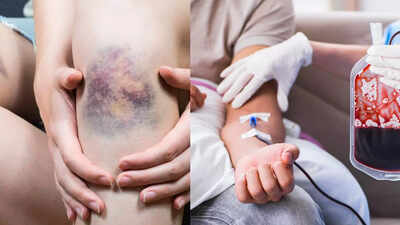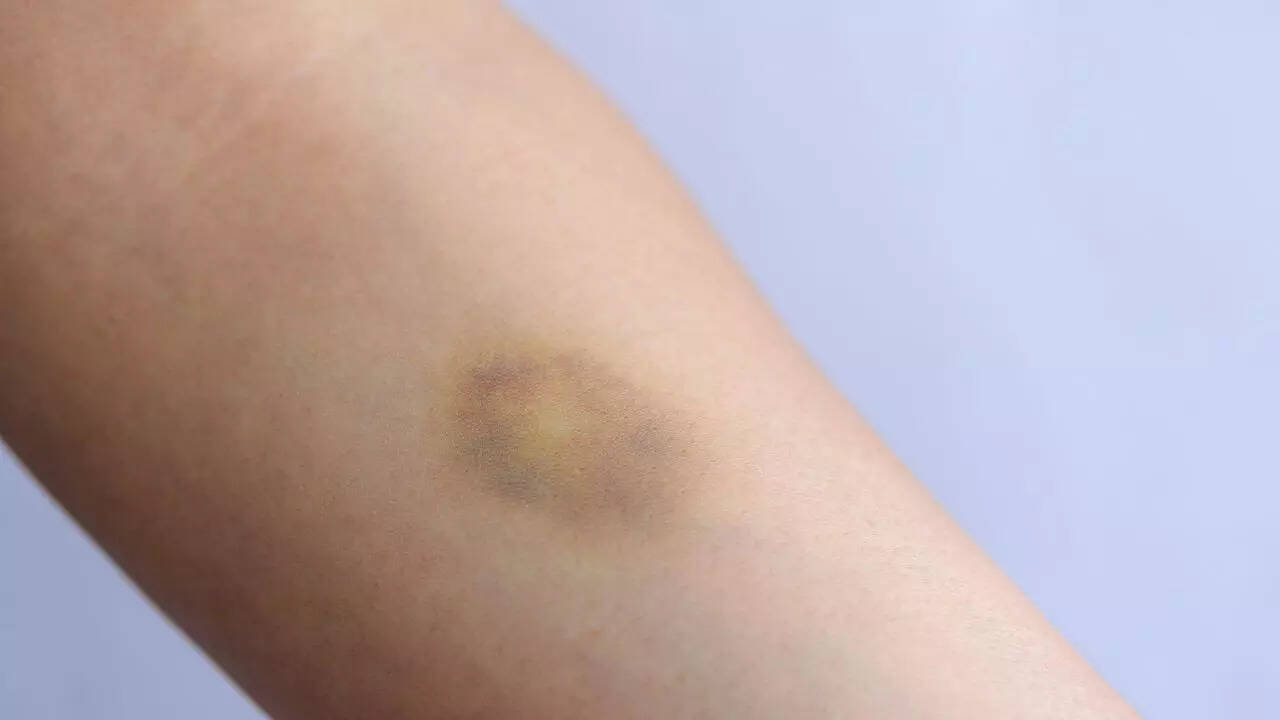ARTICLE AD BOX

Bruises and aches are usually dismissed as minor health issues. A sudden bruise on the arm might be explained away as bumping into something, while shoulder pain is often blamed on posture or overexertion.
However, when these symptoms appear without a clear cause or persist for a long time, they may indicate something more serious—such as blood cancer.According to Blood Cancer UK, unexplained bruising, bleeding, or persistent pain can signal conditions like leukaemia, lymphoma, or myeloma—all of which affect blood and bone marrow function. Around 40,000 people in the UK are diagnosed with blood cancer each year, making it essential to recognise these early warning signs.
Why do unexplained bruises appear
A bruise forms when small blood vessels under the skin break, usually due to trauma. However, if bruises appear without injury, the likely cause is a low platelet count.Platelets and clotting: Platelets are blood cells that help stop bleeding by forming clots. If bone marrow produces fewer platelets—commonly seen in blood cancers—bleeding under the skin occurs easily.Petechiae vs Purpura:
- Petechiae are pinpoint red or purple spots, often mistaken for a rash.
- Purpura are larger patches caused by bleeding deeper beneath the skin.
# On lighter skin tones, these typically appear red or purple.
On darker skin tones, they often appear darker than the surrounding skin or purple-black.

Link between shoulder pain and blood cancer
Shoulder pain is one of the less obvious symptoms, but it may occur when abnormal blood cells build up inside the bone marrow, putting pressure on surrounding nerves and tissues. Patients may experience:
- A dull ache in the shoulder, hips, or spine.
- Pain that worsens at night or when lying down.
- Discomfort that does not respond to over-the-counter pain relief.

In conditions like myeloma, bone tissue may become weaker, leading to bone pain or even fractures. While shoulder pain is often linked to musculoskeletal issues like arthritis, tendon strain, or posture, persistent unexplained pain combined with bruising should be medically assessed.
Blood cancer other key symptoms
Beyond bruising and bone pain, blood cancer presents with a variety of symptoms. Some of the most common include:
- Drenching night sweats that soak clothes and bedding.
- Extreme tiredness that doesn’t improve with sleep.
- Frequent or persistent infections due to weakened immunity.
- Unexplained fevers that come and go.
- Sudden weight loss without dieting.
- Paleness or shortness of breath from low red blood cell counts.
- Itchy rashes or skin changes that don’t resolve.
These symptoms can mimic many common conditions, but when they occur together, they raise concern for underlying haematological problems.
Why skin tone matters in diagnosis of cancer
Symptoms of blood cancer may appear differently across skin tones:
- On fairer skin, bruises progress from red to purple, green, and yellow as they heal.
- On brown or black skin, bruises may initially be hard to spot but later appear as darkened patches.
- Petechiae and purpura can appear as clusters of purple spots that don’t fade when pressed, unlike typical rashes.
This is why patients should pay close attention to texture, tenderness, and skin changes, not just colour.
When to seek medical advice
It’s important not to ignore subtle changes in your body. You should consult a doctor if you notice:
- Frequent unexplained bruising or small red/purple dots on the skin.
- Shoulder or bone pain that lasts for weeks without injury.
- Bleeding from gums, nose, or unusually heavy periods.
- Ongoing fatigue, fever, or weight loss.
- Recurring infections that don’t respond to treatment.
In rare but severe cases, low platelet counts can lead to internal bleeding in the brain, causing headaches, dizziness, or confusion—requiring emergency care.While not every bruise or shoulder ache means cancer, unexplained, recurring, or persistent symptoms should never be ignored. Blood cancer is most treatable when detected early, making awareness a key factor in saving lives.Disclaimer:This article is for informational purposes only and should not be considered medical advice. If you experience unexplained bruising, persistent shoulder pain, or any of the symptoms mentioned, please consult a qualified healthcare professional for proper diagnosis and treatment.Also Read | Is grey hair warning of thyroid, heart, and nutrient issues: How deficiencies and organ stress show in your hair



.png)
.png)
.png)
















 22 hours ago
3
22 hours ago
3









 English (US) ·
English (US) ·